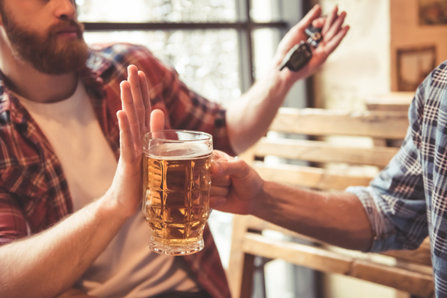How to Establish Boundaries with People Who Drink When You Don’t

One of the hardest things about quitting alcohol is the fact that so many people drink. It is so socially acceptable to drink that it almost seems more uncommon not to drink than it is to drink. Navigating social settings during early recovery can feel like a minefield at times. So while it is good to cut ties with people who are unsupportive of you not drinking, it is nearly impossible to stop interacting with everyone who drinks. That being said, there are some things that should be kept in mind during the transition between being a drinker and non-drinker.
In the beginning, avoid events that have drinking.
When someone is first starting out on their journey of living a sober lifestyle it is a good idea to avoid events that will have a lot of drinking. If you are invited to a friend’s barbecue where you know most of the people will be under the influence it is probably a good idea to politely decline the invitation. As you begin to get more sober time under your belt you will find that it becomes easier to go to events such as these if you decide that is what you want. However, when you are first starting out try not to make things harder on yourself than they already are.
Do not go to bars or nightclubs.
There is a saying that goes “the longer you sit in the barber’s chair the more likely you will be to get your haircut.” The same rings true for spending time in establishments that are based on drinking. The longer you are around it the more likely you will be to slip. This is why it is best to avoid bars and nightclubs altogether.
Establish firm guidelines with friends and family.
Let your close friends and your family know that you are no longer drinking and that you cannot be around them while they are drinking. Most people who truly care about your well-being will be more than supportive about this and if they aren’t, then it probably wouldn’t hurt to spend less time with them anyway.
Be open and honest about your sobriety with your friends.
Sometimes people are able to hide the extent of damage that drinking has caused in their life from their friends. In these types of situations, it helps to open up to the people that you know you can trust about why you have decided to get sober. By understanding the motivation behind your lifestyle switch, your friends will become much better equipped to support you as needed.
Maintain your distance from people who do not respect your boundaries.
If there are people in your life that are constantly bringing you down, drinking around you and not respecting you or your sobriety then it would be a good idea to keep your distance from them. Life is too short to be spent around people who are not supportive of you trying to improve yourself.

Set up an escape plan for certain social settings.
Sometimes you may feel obligated to attend events that will have drinking when you don’t really feel comfortable doing so. Whenever possible it is important to say no to things that you do not feel ready to do when it comes to your sobriety. If you are however obligated to go to a work or family function that will have alcohol make sure to establish an “escape plan” to be able to leave after an hour or so.
Change the routine.
If you and your best friend used to go out for a girls/guys night to grab some drinks, try switching things up. Why not meet up for coffee in the morning or lunch in the afternoon? Sometimes just changing the time of day you hang out with someone will help to avoid a situation that may otherwise turn into a trigger for relapse.
Remember why you wanted to stop in the first place.
Every now and then the thought of having a drink with friends may seem tempting. This is why it is so important to remember your purpose for not drinking in the first place. Remembering the emotional, physical, mental and sometimes legal consequences of past drinking behaviors will help motivate you to not give up.
Remember that not everyone will want to live a sober lifestyle.
Early sobriety can feel a little isolating when most of the people you know drink. It can be easy to look at others and see their unhealthy drinking habits or feel envious of people who are able to drink in moderation. Perhaps the most important thing to remember when it comes to sobriety is that comparing yourself to others will never bring about anything positive. Most of the people you know who drink will probably continue to do so. The important thing is that you maintain your own boundaries and remember that by living a sober lifestyle you are giving yourself the best gift you possibly can—freedom.


